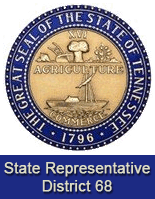Written by Curtis Johnson
Tennessee State Representative
 Nashville, TN – The first session of the 110th Tennessee General Assembly adjourned on May 10th, 2017, after passing major legislation that will benefit Tennesseans for generations to come. This is Part 5 of a 12 Part report.
Nashville, TN – The first session of the 110th Tennessee General Assembly adjourned on May 10th, 2017, after passing major legislation that will benefit Tennesseans for generations to come. This is Part 5 of a 12 Part report.
This includes a measure making Tennessee the first state in the nation to offer all adults without a degree tuition-free access to community college; a new law rebuilding a safe and reliable transportation network, while reallocating revenues to maximize taxpayers’ return on that investment; and a bill which provides a responsible path to improve access to broadband through investment, deregulation, and education.
Action in the General Assembly also included passage of a balanced budget which takes on no new debt, as well as legislation protecting the elderly, enhancing the state’s robust job growth, cracking down on crime, and boosting efforts as the fastest improving state in the nation in K-12 student achievement. Following is a report on key legislation passed this year.

Opioid Abuse / Drug Abuse
State lawmakers continued to take steps during the 2017 legislative session to decrease the number of Tennesseans that abuse opioids. Opioid pain relievers such as oxycodone, hydrocodone, fentanyl, and hydromorphone are responsible for three-fourths of all prescription drug overdose deaths according to the Center for Disease Control (CDC). Tennessee has the second-highest rate of opioid prescriptions in the country, more than one prescription for every man, woman, and child.
As a result, the number of overdose deaths has increased by more than 300 percent over the last two decades. This is despite the fact that over the last several years Tennessee has passed legislation to help prevent abuse by “pill mills” and to strengthen the state’s drug monitoring database.
The legislature continued efforts this year to combat the problem through the passage of several initiatives.
BUDGET
The state’s 2017-2018 budget includes an additional $11.5 million for substance abuse and crisis services. It also includes an Opioid Addiction Treatment Pilot Program at $1 million.
High Risk Subscribers / NAS Data
Legislation was passed this year that requires the Department of Health (DOH) to identify high-risk prescribers of opioids in the state. After being identified and notified of the high risk opioid prescriber status, this legislation requires the prescribers to comply with certain requirements.
The new law calls for the affected prescriber’s waiting rooms and clinical areas to contain materials regarding the risks and complications of drug addiction. After three weeks of therapy and every 30 days thereafter, the prescriber would need to obtain a written consent form for the patient’s record, containing the risks of abuse, signed by the patient.
It also calls for the collection of data available from the Bureau of TennCare and DOH regarding the number of cases in which the source of opiates in the mother of an infant born with Neonatal Abstinence Syndrome (NAS) can be reasonably associated with a substance prescribed to her.
House Bill 1207 / Status: PC 483 / Effective Date: Upon becoming law on June 6th, 2017.
Opiates / Drug-addicted Health Professionals
A bill passed during the 2017 legislative session which creates a new process to identify drug-addicted health care professionals and either suspends their license to protect their patients or compels them to undergo drug-addiction treatment. Under current law, health care systems, like any other Tennessee company, can test for drug abuse randomly or when there is a suspicion of a problem.
However, there is not a requirement to notify the DOH and the appropriate licensing board if a health care professional fails or refuses the test. This new law requires the DOH to be notified when a professional tests positive for drugs and does not have a prescription or valid medical reason.
Upon being reported, the professional will be referred to a peer substance abuse treatment organization for which the professional is licensed. The licensing boards will determine the protocols as to what determines compliance to ensure that the professional is ready to go back to work.
Once the peer organization has determined that the provider has completed the program successfully, the licensing board will be notified so the professional can once again interact with patients.
The new statute also clarifies that quality improvement and peer substance abuse committees can share information regarding drug abuse by a health care practitioner. This clarity helps prevent a drug-addicted provider from moving from one health care facility to the next due to the failure in communicating abuse when one employer calls to question another regarding the work record of the practitioner.
House Bill 1067 / Status: PC 481 / Effective Date: July 1st, 2017.
(REPEAT FROM HEALTH) Schools / Opioid Antagonist
Legislation, which calls on the SBE to develop guidelines to help ensure that every school in the state has an opioid antagonist on hand to counteract a life-threatening opioid drug overdose by a student, passed during the first half of the 110th General Assembly. The new statute also requires each Local Education Agency (LEA) implement a plan based on those guidelines.
Schools will be authorized to purchase two doses if the medication is not available through donation. The opioid antagonist, Naloxone, is sold under the brand name Narcan, among others and is a safe medication used to block the effects of opioids, especially in overdose. The life-saving medication may be administered through a nasal spray or injected.
House Bill 448 / Status: PC 256 / Effective Date: July 1st, 2017.
Buprenorphine
State legislators voted this year to require the Commissioner of the Department of Mental Health and Substance Abuse Services, in collaboration with the Commissioner of the DOH, to develop recommended nonresidential treatment guidelines for the use of buprenorphine. Buprenorphine-containing products, like Suboxone, are used for the treatment of opioid abuse.
It reduces opiate withdrawal symptoms as it produces similar effects to the opioid. It requires the guidelines developed be used by prescribers as a guide for caring for patients by January 1st, 2018. The new statute also calls for the guidelines to be posted online for licensees to access. The measure is similar to a law adopted by the General Assembly providing treatment guidance for the use of pain medication.
House Bill 746 / Status: PC 112 / Effective Date: Upon becoming law on April 7th, 2017.



